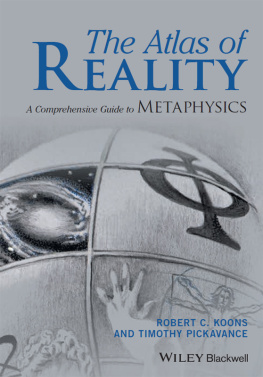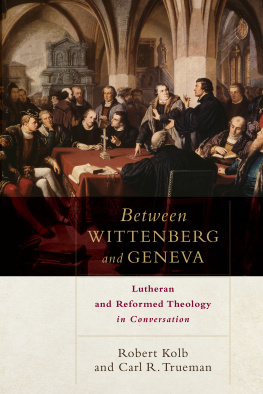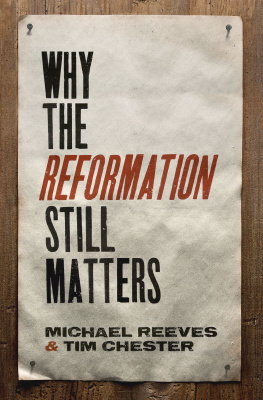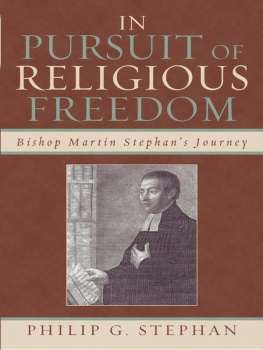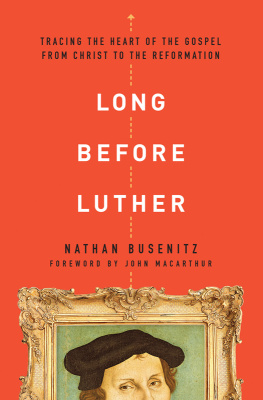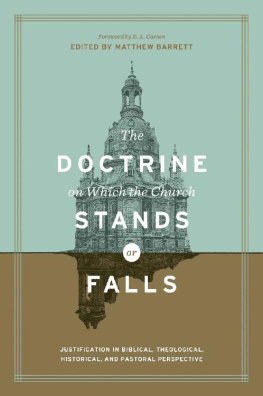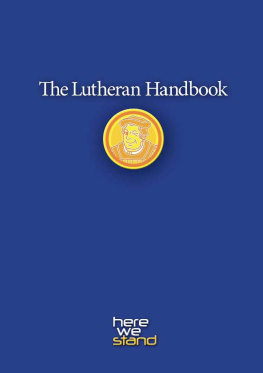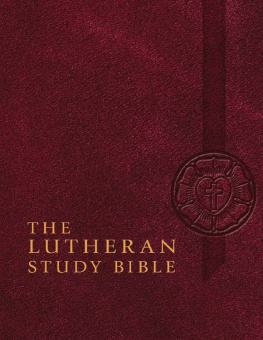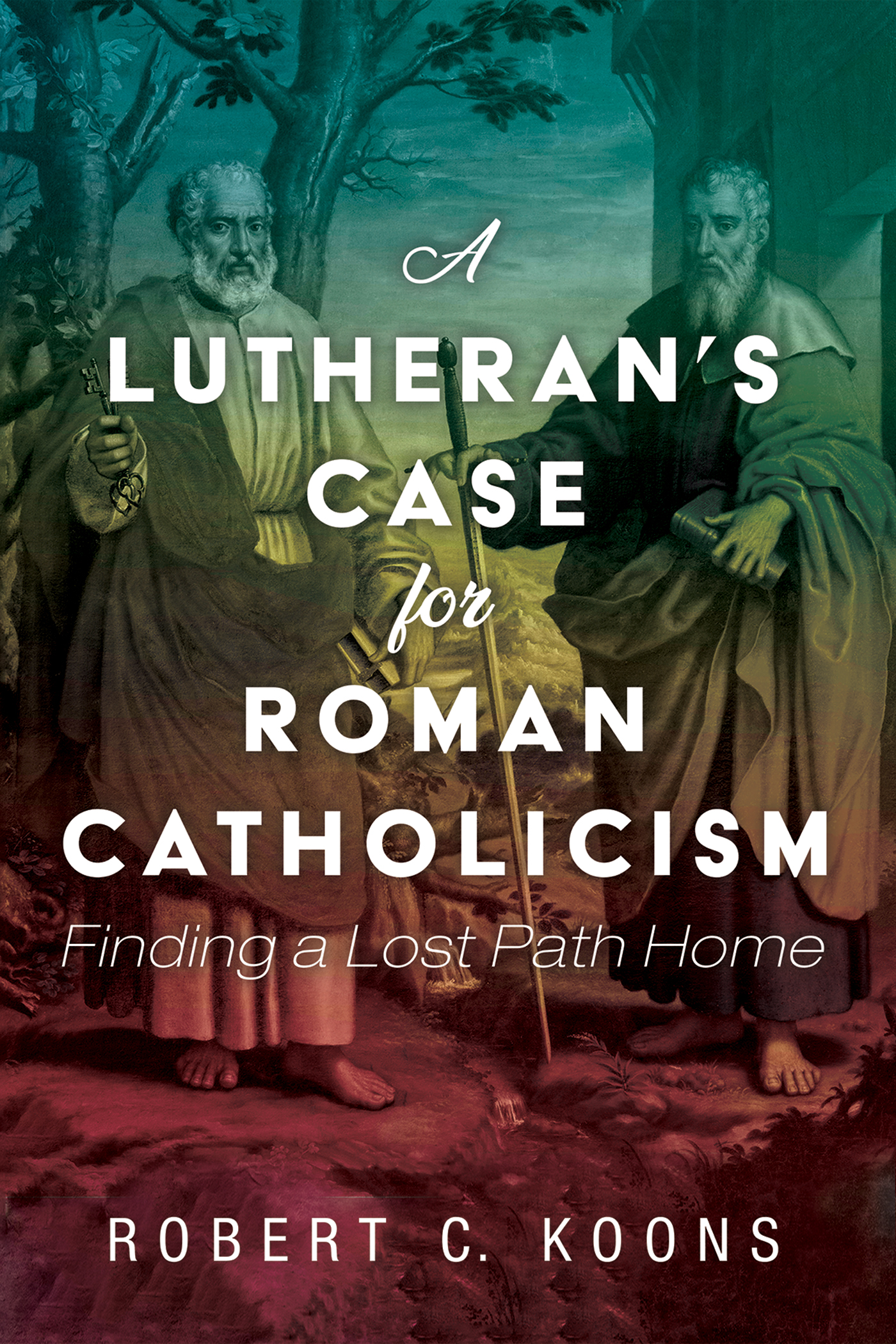A Lutherans Case for Roman Catholicism
Finding a Lost Path Home

Robert C. Koons

The Burden of Proof
W hen I was a college student, a friend of mine invited me to join a group that was reading together some of the works of the Church Fathersthey were reading Cyprian when I joined them. This was a deeply disturbing experience for me, one from which I have never fully recovered, for I found that, contrary to my expectations, the early Fathers sounded much more Roman than proto-Lutheran. Further reading of the patristics when at Oxford and more recently has only confirmed this impression. It is clear beyond all reasonable doubt to me that Luthers, and by extension all of Protestantisms, teaching on justification, insofar as it differs from Roman Catholic theology, was truly novel. It was not simply the recovery of the Augustinian or pre-scholastic doctrine of the Church; it was an unprecedented innovation. If correct, Luther was the first major theologian to recover the true meaning of Pauls epistles.
Many Lutherans have disputed this charge of innovation. This raises an issue of fundamental importance: can the Lutheran doctrine of justification be found in the Fathers? Here we must resist the temptation to engage in what scientists call cherry-picking the dataciting proof texts in which Church Fathers insist that we are saved by faith and by the merits of Christ. These points arent the ones in dispute. The crucial issue is this: is the righteousness by which the justified are justified an alien righteousness, the righteousness of Christ entirely outside of us ( extra nos ) and apart from regeneration and the new kind of life that results? This I cant find this anywhere before Luther. If we look at the corpus of Fathers who are typically cited by LutheransClement of Rome, Ambrose, Basil, John Chrysostom, Augustinewe find that they all give to regeneration and to the fruits of the Spirit a role to play in our justification. In short, we find the Fathers affirming what Lutherans affirm, but not denying what Lutherans deny, and it is the denials rather than the affirmations that are in dispute in the conflict between Rome and the Lutherans.
Some examples:
Those who were perfected in love by the grace of God have a place among the pious who shall be made manifest at the visitation of the kingdom of Christ... [I]f we perform the commandments of God in the concord of love, that through love our sins may be forgiven. (Clement, First letter to Corinth , chapter )
Repentance without alsmsgiving is a corpse and is without wings. (John Chrysostom, On Repentance and Almsgiving , Homily )
For in Jesus Christ neither circumcision availeth any thing, nor uncircumcision; but faith working through love. What is the meaning of working through love? Here he gives them a hard blow, by showing that this error had crept in because the love of Christ had not been rooted within them. For to believe is not all that is required, but also to abide in love. (John Chrysostom, Commentary on Galatians , Homily )
The faith that saves is faith working in charity... Faith without works is not sufficient for salvation... Mortal sins are forgiven through repentance, prayer and almsgiving... Even eternal life itself, which is surely a reward of good works, is called by the apostle a gift of God. But a gift is not a gift at all if it is not made gratuitously. Consequently, we are to understand that even mans good deserts are themselves gifts of God. When, therefore, eternal life is bestowed because of them, what else is this but a return of grace for grace? (Augustine, Enchiridion , chapters , , ).
This point is admitted by both Martin Chemnitz (a second-generation Lutheran reformer and theologian, 1522 ) and by Robert Preus, in his more recent book, Justification and Rome .
An egregious example of this cherry-picking is found in German Lutheran Reformer Philipp Melanchthons ( 1497 1560 ) quotations from St. Augustines On the Spirit and the Letter . Melanchthon picks out a few, brief excerpts from this text, arguing that they establish that the Lutheran doctrine of justification by faith alone (apart from love) is no innovation but is wholly continuous with Augustinian theology. To read the entirety of On the Spirit and the Letter after reading Melanchthon is shocking: in that work, Augustine explicitly rejects the very doctrine that Melanchthon claims to find there. The gap between the plain sense of Augustines text and Melanchthons construction of it is so great that I found my confidence in Melanchthons good faith as a scholar and teacher badly shaken. In appendix C, I provide a few quotations from On the Spirit and the Letter that make clear that in Augustines we are saved by an infused grace that gives us an inherent righteousness consisting in the love of God.
Thomas Oden, a contemporary Methodist theologian, compiled The Justification Reader ( 2002 ) in order to persuade Protestants that they should not disregard the testimony of the ancient Church Fathers. Although this was not Odens primary intention, Odens book could be taken as a defense of the catholicity of the doctrine of justification by faith alone, demonstrating that the doctors of the Church have continuously affirmed it. However, Oden fails to distinguish between the thesis that faith is necessary for justification and the thesis that faith is sufficien t. Odens textual evidence clearly supports the first thesis but utterly fails to support the second. The Lutheran and Reformed doctrine that we are justified by faith alone corresponds exactly to the sufficiency of faith. The necessity of faith (in opposition to the Pelagian heresy) was readily conceded by the Council of Trent.
For example, Oden quotes Origen:
A man is justified by faith. The works of the law can make no contribution to this. Where there is no faith which might justify the believer, even if there are works of law, these are not based on the foundation of faith. Even if they are good in themselves, they cannot justify the one who does them, because faith is lacking, and faith is the mark of those who are justified by God.
Although Origen does affirm that it is possible to be justified by faith without works (he mentions the thief on the cross), he goes on to warn that our works after conversion do have eternal consequences:
But perhaps someone who hears these things should become lax and negligent in doing good, if in fact faith alone suffices for him to be justified. To this person we shall say that if anyone acts unjustly after justification, it is scarcely to be doubted that he has rejected the grace of justification. For a person does not receive the forgiveness of sins in order that he should once again imagine that he has been given a license to sin; for the remission is not given for future crimes, but for past ones.
Odens book establishes that the Fathers understood freely and by grace to mean that we cannot earn salvationthat we can give nothing in return for Gods gift.
We are saved by grace rather than works, for we can give God nothing in return for what is bestowed on us. (Jerome, Epistle to the Ephesians ..)
They are justified freely because they have not done anything nor given anything in return, but by faith alone they have been made holy by the gift of God. (Ambrosiaster, Commentary on Pauls Epistles )


